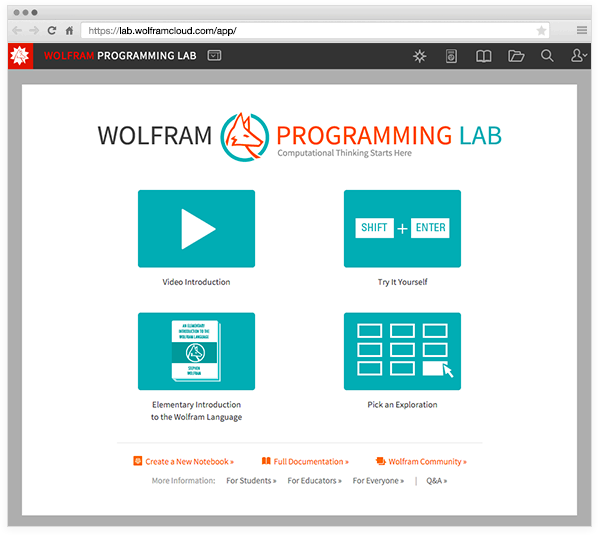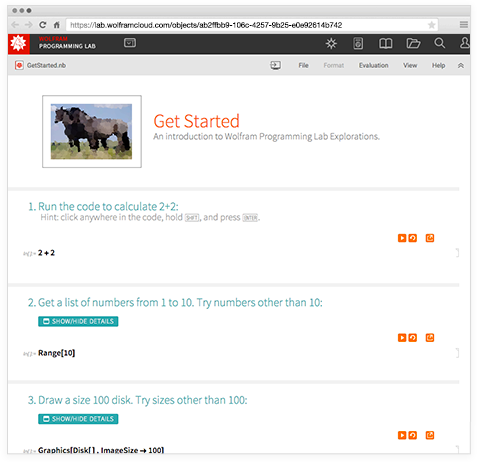Introducing the free Wolfram Programming Lab for learning the Wolfram Language

Translation of the Stephen Wolfram post " Announcing Wolfram Programming Lab ".
Many thanks to Kirill Guzenko KirillGuzenko for his help in translating and preparing the publication.
I am pleased to announce the launch of the Wolfram Programming Lab - an environment for anyone who wants to learn programming and computational thinking with the Wolfram Language . Wolfram Programming Lab can be run both in the browser and on desktop systems (Mac, Windows, Linux).
I have long wanted to find a way to allow anyone, whether children or adults, to get acquainted with the Wolfram Language and all its capabilities, even in the complete absence of knowledge and experience in the field of programming. Now we have it!
The start screen ( see fig. At the very top of the post ) provides an opportunity to follow one of four paths. First, there is a small video. The following is a section called “Try it yourself”, containing some very simple but interesting calculations.
')

Then you can go in one of two directions. Either start training systematically, or immediately plunge into research. My new book Elementary Introduction to the Wolfram Language (see Stephen Wolfram’s book Elementary Introduction to the Wolfram Language in Habrahabr) is the basis for a systematic approach.

The book is fully available at the Wolfram Programming Lab . The idea is that as you read the book, you can implement things yourself, whether it is your own calculations or the examples and tasks presented in the book.

But there is also another way to use the Wolfram Programming Lab - instant immersion in research. The Wolfram Programming Lab presents several research topics (Explorations) with various topics. When you open them, there are several steps in front of you, each containing code that you can run.

To calculate the code, just press Shift + Enter (or the button
 ), and then you can see what it does, somehow correct and calculate your own version. The idea is that everything starts with some kind of ready, working piece of code, which changes. It resembles the situation with the study of natural languages - first you learn to read it, and after that you start writing. You always have the option of clicking the “Show Details” button to get an explanation of what is happening.
), and then you can see what it does, somehow correct and calculate your own version. The idea is that everything starts with some kind of ready, working piece of code, which changes. It resembles the situation with the study of natural languages - first you learn to read it, and after that you start writing. You always have the option of clicking the “Show Details” button to get an explanation of what is happening.
Each study in the way of getting results goes through several steps. But at the end there is usually a Go Further button, which gives suggestions for further research that can be done independently.

If you create something interesting, you can share it with friends, a teacher or someone else. In order to create a web page with implemented content, you just need to click
 .
.How did we come to this
I started thinking about something like the Wolfram Programming Lab for quite some time. I had an excellent experience in personal demonstration of the possibilities of the Wolfram Language to schoolchildren and students. But I wanted to find a way for people to start learning Wolfram Language.
We used our experience in education, putting together what seemed to be a good approach, created prototypes and tested them on groups of children. Often it was a very sobering experience, when the approach proved its lack of viability in a matter of minutes. In some situations, the children were bored and uninteresting. Sometimes they did not understand what they needed to do. Sometimes, they did something little, but clearly did not understand what was happening.
At first, we thought that we just needed to find the very “right approach” - perhaps based on immersion in the language, exercise-oriented, project-oriented or some other. But over time, we realized that we should not limit ourselves to one approach, but we should introduce several interchangeable ones, each of which is more suitable for a particular person. And as soon as we implemented this idea, our tests began to pass more and more successfully, which in the end led us to the creation of the Wolfram Programming Lab that we have now.
What opportunities are there now?
The future and potential of the Wolfram Programming Lab is a very important and exciting topic for me. We have already started developing an ecosystem around it, containing both online and offline educational programs, a large number of opportunities for students, teachers and others, with a wide variety of additional directions for deployment.
The Wolfram Programming Lab can be used for both self-study and teacher training in classrooms. Some things can be explained through demonstrations based on research. You can create projects based on suggestions that Go Further button gives (with streaming live coding if you have the courage). Book Elementary introduction to the language Wolfram Language can be used as a basis for lectures, or for self-reading. Exercises from the book can be used as part of a class work, or as homework.
The Wolfram Programming Lab is what has become possible thanks to the Wolfram Language. Because only with
knowledge-based programming and all the technologies that we have created, it becomes possible to write simple code that generates something really interesting and informative.
This is a very important (if not revolutionary) point in programming.
In the past, it was possible to use a “toy programming language” like Scratch, or a professional low-level language like C ++ or Java. Scratch is very simple, but also very limited. Using C ++ or Java, you can create incomparably more different things (although they do not have built-in knowledge), but they require considerable time investment, deep immersion in technical details in order to create "non-toy" programs.
With the Wolfram Language, however, everything is completely different. Because now even beginners can write programs that do really interesting things. And these programs do not necessarily have to be just academic exercises; these can be programs related to the real world, as well as to the fact that students are currently studying.
The Wolfram Programming Lab gives people ample opportunity to learn programming and allows them to acquire practical skills that are incredibly valuable for their future career. But the Wolfram Programming Lab also contributes to the development of computational thinking - perhaps the central (and constantly gaining momentum) concepts of the modern world.
For many of today's students (and not only), Wolfram | Alpha is something like their “zero” programming language. Wolfram Language is not only an incredibly powerful professional programming language, but it can also be an excellent first language. The Wolfram Programming Lab allows people to learn the Wolfram Language and the basics of computational thinking by delivering material with the simplicity and availability of Wolfram | Alpha.
I am intrigued by how people will use the Wolfram Programming Lab . I think this environment will present programming in an unprecedented light, giving a wide variety of people from around the world the opportunity to join a new generation of programmers who will turn ideas into reality through computational thinking and the Wolfram Language.
Source: https://habr.com/ru/post/275855/
All Articles